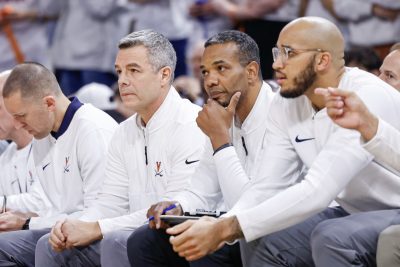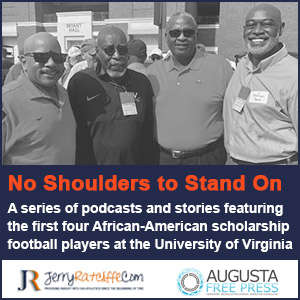Bennett hopes NCAA committee will look at the big picture
By Jerry Ratcliffe
Tony Bennett gave his Cavaliers two days off Sunday and Monday so that they’ll have fresh legs on Saturday when Georgia Tech comes to town for UVA’s Senior Night and regular-season finale.
Bennett and his Virginia staff will spend the rest of the week looking for ways to tweak an offense that has failed to score 50 points in four of its last five games. Seems like they’ve tried just about everything already in an attempt to kick-start the offense, but nothing has really worked.
The Cavaliers headed into the final week of regular-season play riding the NCAA’s proverbial bubble in terms of securing a spot in the postseason tournament field. Researcher Danny Neckel noted Sunday that of the 35 updated brackets that project the tournament field, UVA was included in 30 of them, with an average seed of No. 10.
Neckel also noted that in the past three seasons, any team ranked in the top 35 in SOR (strength of record) and top 50 in NET have made the field. Virginia is in the SOR top 35 and top 50 of NET.
Still, Bennett feels like his team belongs in the tournament considering its entire body of work, and shouldn’t be judged just on its recent results or any one particular metric.
“I hope when the NCAA committee is behind closed doors, they’ll look and say, ‘OK, let’s look at all the factors, not just NET, not just the eye test,’” Bennett said Monday.
The Virginia coach believes all the Power Six conferences in basketball aren’t that different from one another, especially when observers examine how teams fared in cross-conference play during early-season and holiday tournaments, such as the ACC-SEC Challenge and other events.
Bennett also pointed out ACC colleague Brad Brownell’s recent criticism of how the Big 12 manipulated the NET by running up scores on weaker nonconference opponents early in the season, and how the tournament committee should take that into consideration.
“It’s interesting that there are few, if any, poorly coached teams anymore,” Bennett said. “[Coaching] staffs have their specialties to where it has almost become like football. You have offensive coordinators.
“And then there’s the use of video and analytics. There’s so many well-coached teams. The young coaches are good. I think when you talk about the state of college basketball, let’s just talk about talent. This might be the best [talent] the last few years with the transfer portal. I don’t think the game’s talent has ever been much better than this, and that makes it challenging.”
The transfer portal and NIL, in one way, has become the great equalizer, as long as a college program chooses to take full advantage of those relatively new factors. A coach can rebuild his entire roster with experienced players almost overnight, or potentially lure talent to his program via a lucrative NIL package.
No wonder Bennett said it’s getting harder to win in college basketball with so much parity, in addition to better coaching and analytics.
Still, Bennett pointed out his team, despite all of its shortcomings, has still managed to hang onto third place in a very balanced ACC, with perhaps the youngest and newest team he’s had in his 15 seasons at Virginia.
Should the Cavaliers (21-9, 12-7 in the conference) prevail against Georgia Tech, UVA will lock up third place and a double-bye for next week’s ACC Tournament in Washington, D.C. (Syracuse, Clemson, Pitt and Wake Forest each have 8 league losses).
“At times, we’ve gotten overwhelmed at the start of games where our inexperience and some of our limitations do show, and that’s real,” Bennett said. “We just keep knocking at the door. We’re in this spot, let’s improve.
“We just went into one of the tougher settings (Duke’s Cameron Indoor Stadium) against one of the best teams. Now let’s address it and get as ready as we can. Some teams have a smaller margin of error, a finer line than others, and we know where we’re at.”
Virtually no one realistically believed Virginia would threaten North Carolina or Duke for league supremacy this season. Those teams boast too much talent. Still, the Cavaliers managed enough success in the ACC to possibly finish third, one slot higher than they were projected in the preseason poll.
All that with essentially one starter back from last year in Reece Beekman, who has been a dynamo for the Cavaliers down the homestretch. Beekman, having a spectacular season, hasn’t had a lot of help as defenses have figured out methods to reduce Virginia’s offensive output.
UVA figured to be better than this offensively, with Isaac McKneely bombing 3-pointers along with transfers Jake Groves and Andre Rohde, both having impressive numbers at their former schools. Groves has been hot and cold, while Rohde has basically been flat-out cold. Ryan Dunn, great around the basket as a slasher and dunker, has been haunted by an unreliable jump shot for the most part.
Opposing defenses often dare Rohde and Dunn to shoot, which allows them to choke off driving lanes in order to cut Beekman’s access to the hoop. It also allows defenses to focus more on harassing McKneely.
That essentially leaves Jordan Minor and Blake Buchanan the challenge of dominating the paint, which, depending on matchups, can be a tall order.
This is not Bennett’s worst offense. UVA is currently scoring 63.2 points per game and shooting 43.4 percent from the field, 36.2 percent from the arc and 64.9 percent from the free-throw line.
Bennett’s second team at Virginia (2010-11), which finished 16-15 in a rebuild from the Dave Leito era, shot 41.5 percent. The team that followed the national championship year in 2019-20 was the worst, with a 41.3 percentage. That team, cut short by the Covid pandemic, finished 23-7 with no postseason play.
This could, however, finish as the worst free-throw shooting team in UVA history if it isn’t careful. The present 64.9 percentage, which has improved the last couple weeks, presently is the third-worst ever by a Cavaliers team.
The 1967-68 team was the worst from the free-throw line, making 63.3 percent of its shots over that season, beating out the second-worst, the 1961-62 team with a 64.2 percentage.









